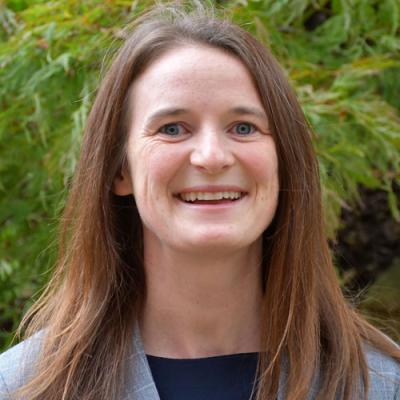Congratulations to Anne I. Roche on being selected as the Student Spotlight Award winner for March 2021!
The purpose of this award is to highlight students who are doing important work in the CBS community whether for research, clinical, and/or volunteer-humanitarian efforts.
This is a way to highlight their achievements, let the ACBS community know important work students are doing, and possibly provide a platform for mentoring, collaboration, professional development, and conversations around highlighted areas.
Learn more about Anne I. Roche:
Background of CBS Research/Clinical/Volunteering efforts/achievements:
My research as a graduate student has focused on the association between acceptance and mindfulness processes and behavioral, physical, and psychological outcomes. I have studied acceptance and mindfulness across the lifespan, from adolescence to older adulthood. My principal aim is to contribute to the identification of modifiable targets for psychological intervention. My dissertation project, mentored by my wonderful advisor Dr. Natalie Denburg, is a randomized controlled trial examining the impact of group ACT on psychological outcomes (e.g., well-being) in community-dwelling older adults. Older adults inevitably experience a variety of life changes, and the limited research focused on promoting well-being in this population is a diversity issue at both an individual and societal level. I am hopeful that my dissertation will provide useful insights into the potential utility of acceptance- and mindfulness-based interventions in this growing proportion of our population. Concurrently, our group is working to validate existing ACT measures this population. Most recently, I have contributed to research examining mental health during the COVID-19 pandemic and how ACT processes may serve as protective factors during this time period.
Clinically, I have had strong training in ACT and other CBS-based interventions from mentors such as Dr. James Marchman and Dr. Emily Kroska at the University of Iowa. Beyond the excellent training in my graduate program, I have sought additional in-person and online training workshops from CBS practitioners. I have had the opportunity to deliver CBS-based interventions in a variety of different settings and with both individuals and groups with diverse presenting concerns. I have delivered ACT interventions with domestic violence victims (group setting), with domestic violence offenders (individually), and with community-dwelling older adults (group setting). Additionally, I have had the opportunity to provide tiered teaching and supervision to junior clinical psychology students in delivering evidence-based behavioral interventions.
Autobiography:
I am a sixth-year graduate student at the University of Iowa, where I am mentored by Dr. Natalie Denburg. I am currently completing my clinical internship at the University of Kansas Medical Center. I was introduced to ACT during my first year of graduate school, and I was immediately hooked. I have had the opportunity to be trained in functional contextualism by exceptional teachers such as Dr. James Marchman and Dr. Emily Kroska who have instilled in me a passion for learning, delivering, sharing, teaching, and living ACT. I have now had the chance to attend three ACBS World Conferences which have inspired and fed my curiosity and desire to learn. I hope to pursue a career that allows me to combine clinical, research, teaching, and supervision activities that will contribute to the CBS community and help to impact lives with CBS approaches.
Outside of my graduate training, my values include my amazing and loving family and my dear friends. Years ago, I played college basketball, and I still very much enjoy following sports, being active, and spending time outdoors.
Future goals:
I hope to pursue a career that allows me to explore, deliver, teach/supervise, and disseminate ACT and other CBS-based interventions.
Relevant publications:
Kroska, E.B., Roche, A. I., Adamowicz, J.L., & Stegall, M.S. (2020). Psychological flexibility in the context of COVID-19 adversity: Associations with distress. Journal of Contextual Behavioral Science, 18, 28-33. https://www.ncbi.nlm.nih.gov/pmc/articles/PMC7406424/
Kroska, E.B., Roche, A.I., & O’Hara, M.W. (2020). How much is enough in brief acceptance and commitment therapy? Journal of Contextual Behavioral Science, 15, 235-244. https://www.sciencedirect.com/science/article/abs/pii/S2212144719302364?via%3Dihub
Green, M. A., Miles, L., Sage, E., Smith, J., Carlson, G., Hogan, K., Bogucki, J., Ferenzi, L., Hartman, E., Tao, Y., Peng, Y., Roche, A.I., Bolenbaugh, M.A., Wienkes, C., Garrison, Y., & Eilers, S. ... & Peng, Y. (2020). Cardiac biomarkers of disordered eating as a function of diagnostic subtypes. Eating Behaviors, 39, 101425.
Howren, M.B, Christensen, A.J., & Roche, A.I. (2020). Cognitive behavioral and eHealth approaches to promote engagement in treatment. In A. Hadler, S. Sutton, & L. Osterberg, (Eds), The Wiley Handbook of Healthcare Treatment Engagement (pp. 223-242). John Wiley & Sons, Inc. https://onlinelibrary.wiley.com/doi/abs/10.1002/9781119129530.ch12
Roche, A.I. (2019). Testing for testamentary capacity in the older adult: A model of ethical considerations for the clinical neuropsychologist. Frontiers in Psychology, 10, 1905.
Pierson, M.M., Roche, A.I., & Denburg, N.L. (2019). Mindfulness, experiential avoidance, and affective experience in older adults. Journal of Contextual Behavioral Science, 14, 32-36. https://www.sciencedirect.com/science/article/pii/S2212144719300341
Roche, A.I., Kroska, E.B., & Denburg, N.L. (2019). Acceptance- and mindfulness-based interventions for smoking cessation and weight loss: Systematic reviews and meta-analyses. Journal of Contextual Behavioral Science, 13, 74-93. https://www.sciencedirect.com/science/article/abs/pii/S2212144718302722
Vélez-Bermúdez, M., Christensen, A. J., Kinner, E. M., Roche, A. I., & Fraer, M. (2019). Exploring the relationship between patient activation, treatment satisfaction, and decisional conflict in patients approaching end stage renal disease. Annals of Behavioral Medicine, 53, 816-826.
Roche, A.I., Kroska, E.B., Miller, M.M., Kroska, S.K., & O’Hara, M.W. (2019). Childhood trauma and problem behaviors: Examining the mediating roles of experiential avoidance and mindfulness processes. Journal of American College Health, 67, 17-26. https://www.tandfonline.com/doi/abs/10.1080/07448481.2018.1455689
Kroska, E.B.*, Roche, A.I.*, & O’Hara, M.W. (2018). Childhood trauma and somatization: Identifying mechanisms for targeted intervention. Mindfulness, 9, 1845-1856. https://link.springer.com/article/10.1007/s12671-018-0927-y
Kroska, E. B., Miller, M. L., Roche, A. I., Kroska, S. K., & O’Hara, M. W. (2018). Effects of traumatic experiences on obsessive-compulsive and internalizing symptoms: The role of avoidance and mindfulness. Journal of Affective Disorders, 225, 326-336. https://www.sciencedirect.com/science/article/abs/pii/S0165032717308005
Manuscripts Under Review
Roche, A. I., Adamowicz, J. L., Stegall, M. S., Toovey, C.R., & Kroska, E.B. (under review). College student resilience during COVID-19: Examining the roles of mindfulness, compassion, and prosocial behavior.
